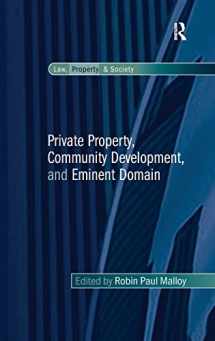
Private Property, Community Development, and Eminent Domain (Law, Property and Society)
ISBN-13:
9780754672111
ISBN-10:
0754672115
Edition:
1
Author:
Robin Paul Malloy
Publication date:
2008
Publisher:
Routledge
Format:
Hardcover
230 pages
FREE US shipping
Book details
ISBN-13:
9780754672111
ISBN-10:
0754672115
Edition:
1
Author:
Robin Paul Malloy
Publication date:
2008
Publisher:
Routledge
Format:
Hardcover
230 pages
Summary
Private Property, Community Development, and Eminent Domain (Law, Property and Society) (ISBN-13: 9780754672111 and ISBN-10: 0754672115), written by authors
Robin Paul Malloy, was published by Routledge in 2008.
With an overall rating of 4.0 stars, it's a notable title among other
books. You can easily purchase or rent Private Property, Community Development, and Eminent Domain (Law, Property and Society) (Hardcover) from BooksRun,
along with many other new and used
books
and textbooks.
And, if you're looking to sell your copy, our current buyback offer is $0.3.
Description
The contributors in this volume address the fundamental relationship between the state and its citizens, and among the people themselves. Discussion centers on a recent decision by the United States Supreme Court in the case of Kelo v. City of New London. This case involved the use of eminent domain power to acquire private property for purposes of transferring it by the State to another private party that would make "better" economic use of the land. This type of state action has been identified as an "economic development taking". In the Kelo case, the Court held that the action was legal within provisions of the US Constitution but the opinion was contentious among some of the Justices and has been met with significant negative outcry from the public. The Kelo case and the public debate arising in its aftermath give cause to assess the legal landscape related to the ability of government to fairly balance the tension between private property and the public interest. The tension and the need to successfully strike a balance are not unique to any one country or any one political system. From the United States to the United Kingdom, to the People's Republic of China, property and its legal regulation are of prime importance to matters of economic development and civic institution building. The Kelo decision, therefore, explores a rich set of legal principles with broad applicability.


We would LOVE it if you could help us and other readers by reviewing the book
Book review

Congratulations! We have received your book review.
{user}
{createdAt}
by {truncated_author}


